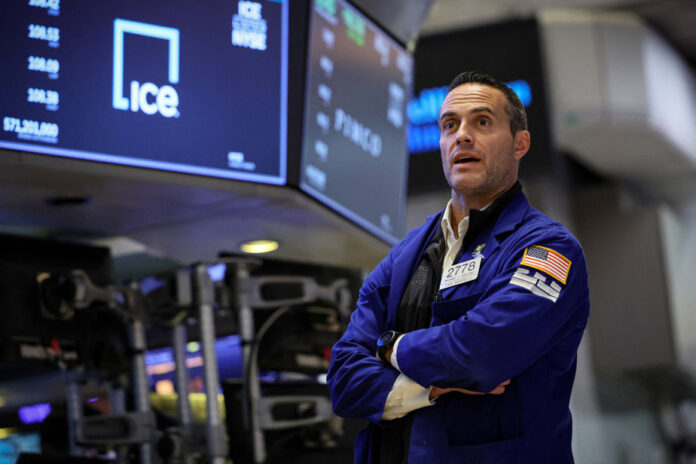(New York) The New York Stock Exchange ended on a mixed note on Wednesday, deprived of a rebound by a new surge in bond rates and oil prices, which threaten to take the wind out of the American economy.
The Dow Jones lost 0.20%, while the NASDAQ index gained 0.22%, the broader S
“We are facing this relentless rise in bond rates,” commented Jack Ablin, of Cresset Capital, “and this affects real rates (excluding inflation), that is to say on the price paid by the American State” on its debt service.
On Wednesday, the yield on 10-year US government bonds soared to 4.64%, a first since October 2007.
“There are a lot of movements at work that are creating a difficult environment for investors,” continued Jack Ablin. “Rates, of course, but also oil prices and the strengthening dollar. »
The barrel of American West Texas Intermediate (WTI) ended Wednesday at its highest closing level in a year, while the other reference variety of the oil market, Brent from the North Sea, is only ‘a breath away from 100 dollars.
“We will have to wait for this to stop so that the stock market can regain its senses,” warns Jack Ablin.
To make matters worse, the probability of a suspension of certain state services in the absence of a budgetary agreement increased further on Wednesday, after the rejection, by the Republican President of the House of Representatives, Kevin McCarthy, of a proposed text by the Senate.
In the absence of a text postponing the budgetary debate, the “shutdown”, which would prevent the government from paying some of its civil servants, will take place on September 30.
Illustrating the climate on Wall Street, the VIX index, which measures investor nervousness, reached a new high of more than four months.
On the market, against all expectations in this tense context, so-called defensive values, that is to say theoretically less sensitive to the economic situation, weighed down the Dow Jones, like Johnson
The NASDAQ, for its part, was encouraged by semiconductor manufacturers, Intel (2.31%) and AMD (2.20%). The latter’s chief executive, Lisa Su, made encouraging statements about the potential of artificial intelligence for the chip industry.
Meta was poorly received (-0.40%) despite the presentation of new products during its Connect conference, notably the new Meta Quest 3 virtual reality headset.
The new surge in black gold prices has had repercussions on oil stocks, notably ExxonMobil (3.26%) and ConocoPhillips (2.97%).
The semi-wholesale chain Costco capitalized (1.91%) on the publication of quarterly turnover and net profit above expectations.
The IT architecture and cybersecurity group Cloudflare rose (6.81%) after announcing a partnership with Nvidia which will allow it to deploy new capabilities for its customers to manage artificial intelligence.
The toy manufacturer Mattel had the wind in its sails (2.92%), driven by the buy recommendation from analysts at Morgan Stanley, who see the group well positioned in a difficult macroeconomic context.
Several American regional banks were once again under pressure, with soaring interest rates forcing them to pay more on their deposits, or risk losing part of them to other investments.
Often mentioned during the spring banking crisis, because considered possible weak links in the system, the Arizona brand Western Alliance (-1.54%) and the Salt Lake City (Utah) bank, Zions (- 2.41%), both ended up in the red.
The Toronto Stock Exchange fell more than 100 points on Wednesday as widespread losses outweighed strength in the energy sector and rising crude oil prices.
The composite index S
In the foreign exchange market, the Canadian dollar traded at an average rate of 73.99 US cents, down from 74.02 US cents on Tuesday.
On the New York Mercantile Exchange, crude oil rose US$3.29 to US$93.68 per barrel, while natural gas rose 5 US cents to US$2.90 per barrel. million BTUs.
Gold prices plunged US$28.90 to US$1,890.90 per ounce and copper prices depreciated US$1 cent to US$3.64 per pound.















